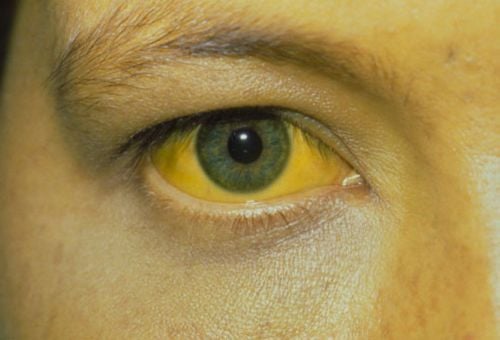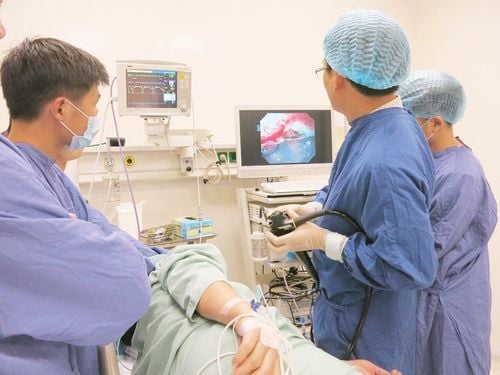This is an automatically translated article.
Post by Master, Doctor Mai Vien Phuong - Gastrointestinal Endoscopy - Department of Medical Examination & Internal Medicine - Vinmec Central Park International General Hospital.Irritable bowel syndrome and colon cancer affect the digestive tract, so they share some symptoms. However, people with irritable bowel syndrome do not have an increased risk of precancerous polyps or colon cancer.
1. Learn about irritable bowel syndrome
1.1. Signs and Symptoms of Irritable Bowel Syndrome Some of the most common signs and symptoms of irritable bowel syndrome are changes in bowel movements, including:
Constipation Diarrhea Abdominal pain Bloating Abdominal bloating mucus in the stool Certain foods or when under extreme stress can cause symptoms of irritable bowel syndrome. Although this is a chronic condition, these symptoms can come and go. Women tend to experience an increase in symptoms during menstruation.
For most people with irritable bowel syndrome, the symptoms are not too severe and can be managed with lifestyle changes. People with severe symptoms may also need medication to control the disorder.
1.2. Diagnosing irritable bowel syndrome To diagnose irritable bowel syndrome, your doctor will ask about all the medications you take; recent infections and stress or your diet and personal and family history of celiac disease, colon cancer, or inflammatory bowel disease.
To confirm the diagnosis, your doctor will also do a general physical exam to check for abdominal distension and tenderness. You may not need additional tests to diagnose irritable bowel syndrome, but some of the following tests can rule out other conditions:
Blood tests to check for infections, anemia and problems other digestion. Stool tests to check for infection, presence of blood, and other illnesses. Diagnosis involves one symptom pattern, including abdominal pain and two or more of the following:
Abdominal pain that gets better or worse after a bowel movement. Your bowel movements are more frequent or less frequent than usual. There has been a change in the form of your stool. You may be diagnosed with irritable bowel syndrome if:
Symptoms started at least 6 months ago You have had problems at least once a week for the past 3 months

During colonoscopy, precancerous polyps can be removed before they develop into cancer. Typically, colon cancer presents with the following symptoms:
Abdominal cramps or pain Constipation Dark stools or blood in stools Diarrhea bloating Fatigue Flat stools Rectal bleeding Unexplained weight loss 2.2 . Diagnosing Colon Cancer Similar to irritable bowel syndrome, your doctor will also ask for your complete personal and family medical history. In addition to a physical exam, your doctor may order blood and stool tests. If cancer is suspected, other tests may be done, including:
Colonoscopy along with tissue biopsy Imaging tests, such as X-rays or CT scans of the colon and rectum Medical devices can confirm the presence of colon cancer, and imaging tests can help assess whether the cancer has spread.
3. Distinguishing Irritable Bowel Syndrome and Colon Cancer Although some symptoms of irritable bowel syndrome and colon cancer are similar, there are some differences to keep in mind:
| Triệu chứng | Hội chứng ruột kích thích | Ung thư đại tràng |
| Đau quặn bụng hoặc đau liên quan đến đi tiêu | X | X |
| Thay đổi thói quen đi tiêu kéo dài hơn vài ngày | X | X |
| Táo bón | X | X |
| Tiêu chảy | X | X |
| Cảm thấy đi tiêu không hết phân | X | X |
| Đầy hơi hoặc trướng bụng | X | X |
| Chất nhầy màu trắng trong phân | X | |
| Phân sẫm màu hoặc có máu trong phân | X | |
| Mệt mỏi | X | |
| Yếu toàn thân | X | |
| Phân nhỏ dẹt | X | |
| Chảy máu trực tràng | X | |
| Giảm cân không rõ nguyên nhân | X |
A 2010 trial showed that when colonoscopy was performed, people with irritable bowel syndrome had no more structural abnormalities of the colon than healthy people.
They also found that people with irritable bowel syndrome did not have an increased risk of precancerous polyps or colon cancer.
However, before diagnosing you with irritable bowel syndrome, it is still advisable to perform an upper and lower gastrointestinal endoscopy to rule out a gastrointestinal cancer or inflammatory lesions of metaplasia, colon polyps...
In case you have abdominal discomfort, change in bowel habits, persistent abdominal pain, rectal bleeding, vomiting, weight loss, go to a medical facility. medical for examination. For most people, colonoscopy screening should begin at age 50. If you have a family history of colon cancer or other risk factors, your doctor may recommend earlier screening. or more often.
In a nutshell, irritable bowel syndrome can often be managed by making some other dietary and lifestyle changes. More severe cases can be treated with medication.
Irritable bowel syndrome does not increase the risk of developing colon cancer. Symptoms of colon cancer tend to appear only after the disease has spread. Colon cancer screening can detect and remove precancerous polyps before they have a chance to develop into cancer.
Please dial HOTLINE for more information or register for an appointment HERE. Download MyVinmec app to make appointments faster and to manage your bookings easily.
References:Chey WD, et al. (2010). The yield of colonoscopy in patients with non-constipated irritable bowel syndrome: Results from a prospective, controlled US trial. DOI: 10.1038/ajg.2010.55 Mayo Clinic Staff. (2019). Colon cancer. mayoclinic.org/diseases-conditions/colon-cancer/symptoms-causes/syc-20353669 Mayo Clinic Staff. (2018). Irritable bowel syndrome. mayoclinic.org/diseases-conditions/irritable-bowel-syndrome/symptoms-causes/syc-20360016 Signs and symptoms of colorectal cancer. (2020). cancer.org/latest-news/signs-and-symptoms-of-colon-cancer.html Symptoms & causes of irritable bowel syndrome. (2017). niddk.nih.gov/health-information/digestive-diseases/irritable-bowel-syndrome/symptoms-causes














